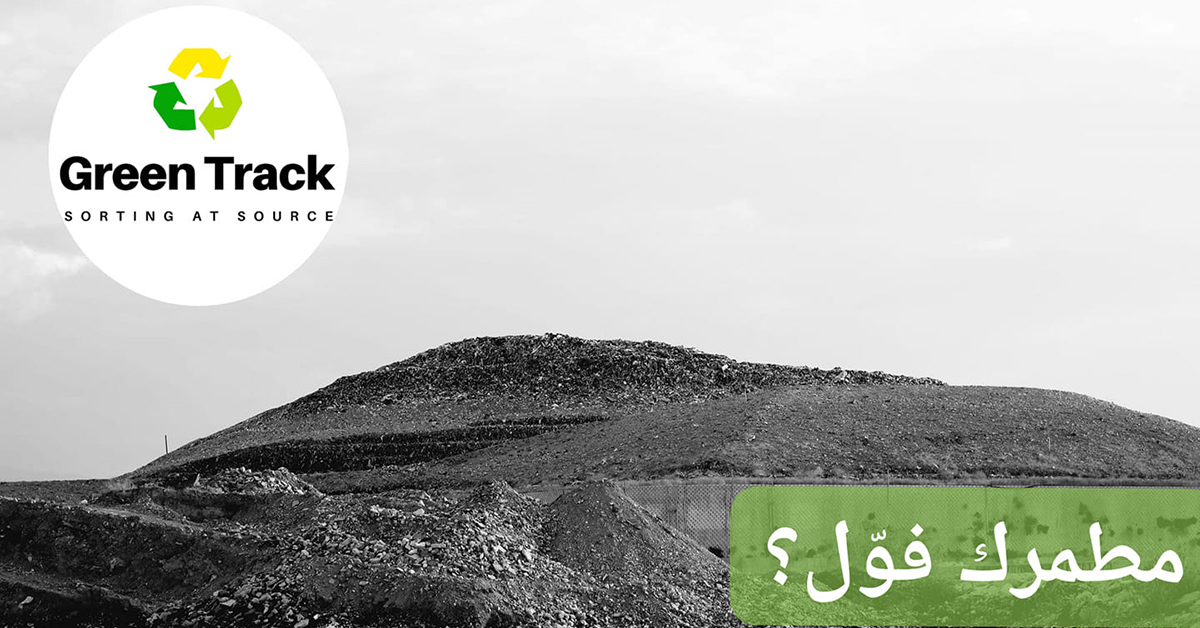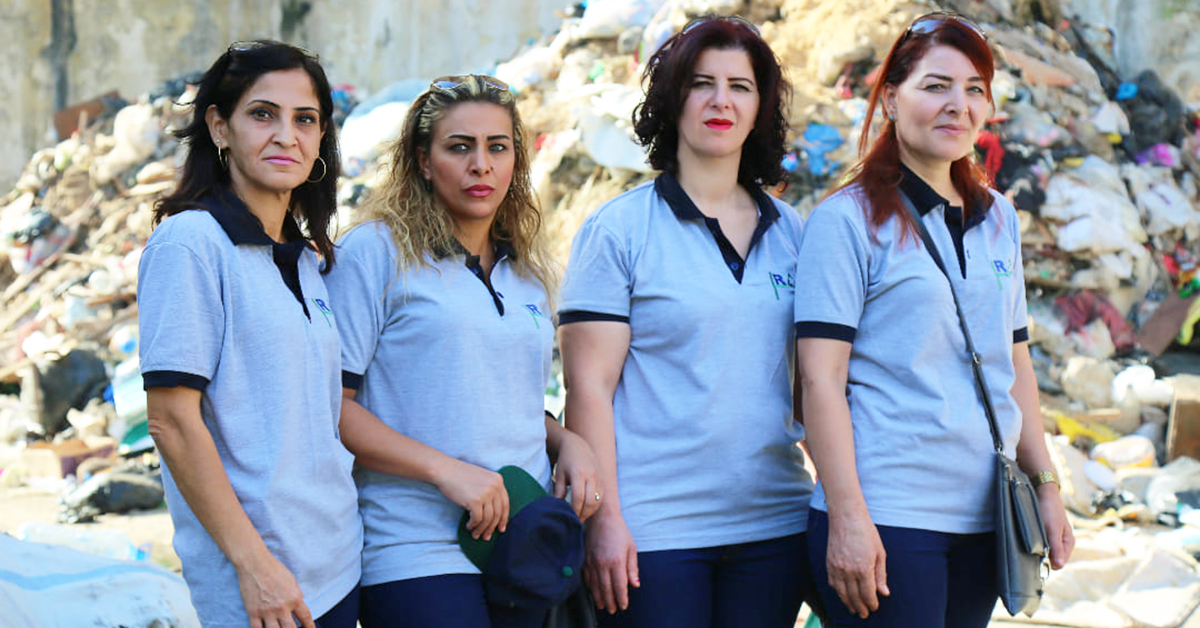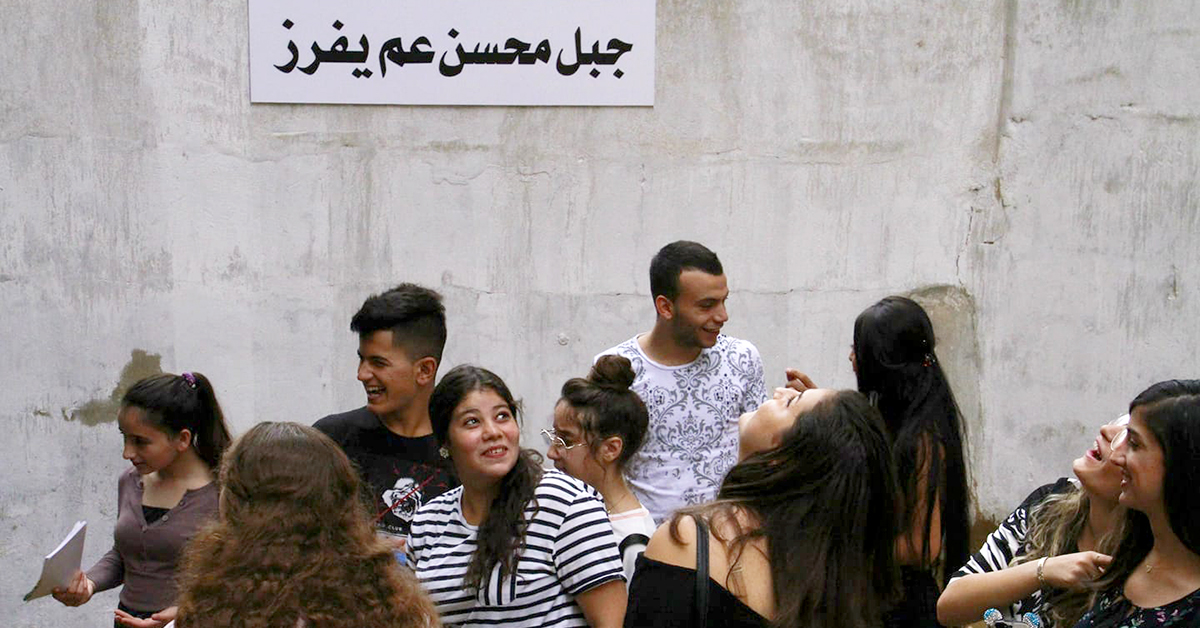
Asking people to sort their waste is not a simple task. In the words of Khoder Eid, Lebanon’s waste crisis will only escalate, as the country faces a severe waste management problem coming from the lack of effort in sorting, collecting and reducing waste.
It takes a tremendous effort to build a sustainable culture geared towards sorting and recycling and the only way to do that according to Khoder is through continuous awareness on the subject. His solution – Green Track, is a startup with a mission of encouraging sorting at source.
Berytech got together with Khoder to discuss Green Track, and how his team is changing waste management culture, one house at a time.
A solution to an imminent problem
Khoder has a double master’s in finance and sustainable development. He is driven by the concepts of sustainability in every aspect of his life. While he struggled to find employment, the lack of opportunities in his field led him to create his own. “Programs supporting startups with impact were scarce in 2016. I saw an opportunity in the program run by the El Ahli group with the ESA Business School. I applied to the program while looking for a startup idea that was economically sustainable and with social and environmental impact.
At that time, the closure of the Nehme landfill had exposed the severity of the waste crisis in the country. While thinking of a solution to that problem I concluded that a drastic change of culture was needed and the only way that could happen was through intensive awareness campaigns to push people to sort their waste.
All the experts told me to forget the idea, that sorting at source will not even cover the expenses, that it’s a failing project that won’t make me money. I ignored all their advice.”
As a test to his idea, Khoder started by convincing his mother and her friends on the importance of sorting at source and the need to create an awareness campaign involving his neighborhood in Tripoli. He printed a small brochure, and the ladies went door to door in the neighborhood telling people to sort their garbage and separate them into recyclables and organic, and that they would pick up the bags every Monday and Thursday for free.
“They visited 5000 houses. I rented a small space thinking I would not get any response. I was shocked by the number of responses we received. Sixty to eighty percent of these houses started sorting. We filled the small space and the recyclables started piling up, so I rented a warehouse and Green Track picked up from there.”
A multi-layered mission

The first mission of Green Track is to educate the Lebanese people about sorting at source which translates into three phases. The first is to raise awareness about separating recyclables from organic material. The second is the collection and re-sorting of the waste generated by these households, and the third is selling the collected recyclables to industrial companies who use them as raw material for their operation.
A team of ‘Green Women’ give door-to-door awareness sessions to households in Tripoli and teach them how to sort and where to put their sorted waste. The startup has adopted a simple flyer that teaches people how to separate waste into recyclables and organic waste in blue and black bags. These are disposed of in blue and black bins strategically placed under each building.
Khoder believes that when people see that the garbage is being collected separately while respecting the sorting process, they will trust the system and continue to place efforts in sorting.
“Industrial companies buy our clean, compacted and good quality raw material: plastic, metal, paper and cardboard, glass, electronics, and fabric. When you do the sorting at the source, the waste we receive in the facility is clean. We can use organic waste in composting and the value of clean recyclables increases. When we sell the raw material to a factory, it will not spend a lot of energy on cleaning it to use it.
With the right system we get the results we want, but for that we need the right infrastructure – people do not have the right resources to sort. This is why we need to provide these resources, from the bins to the collection method. Then we show them how the community is benefiting from recycling, whether through the decrease of imports of raw material in plastic and paper or the increase of exports of metal or the reduction of the amount of dumping and incineration.”
A clear vision in sustainability
From his test phase in 2016, in which he reached 5000 homes after 1 month of awareness and 2 months of collecting in Jabal Mohsen, Khoder received an investment from Fondation Diane to expand his operation. In 2018, he grew his team of Green Men and Women and purchased the necessary equipment, reaching out to new areas in Tripoli with 1300 kg of waste sorted every week.
By then the vision of Green Track was clear: Encouraging the sorting at source in Lebanon while implementing sustainable waste management systems that respect the environment and contribute to the local development through the employment of inactive women and youth.
“Education in sorting at source starts with the youth who impact future choices and form the first step to start changing the culture. We work closely with municipalities, NGOs, companies, and schools to help them raise awareness about sorting at source. We study their needs and offer them advice from personalized awareness campaigns to providing the expertise of the team and the flexibility of adaptation with a hands-on approach.
An example of this type of education is an event the team created in Tripoli for a whole day where it hosted 4000 kids offering them 10 different activities to raise their awareness of the importance of sorting. This impacts the actions of new generations for the future because we see Culture as a connected chain that needs time to change.”
So far, Green Track has reached 22,500 households and created 97 jobs. The startup generates an income from selling the sorted raw material, from commissioned awareness campaigns and events and from investment subsidies to finance new bins and projects.
The environmental impact

Proper waste management means looking at how we use the waste we generate, deviating away from dumping, and incineration into generating raw material for industries. Without sorting at source, the country’s garbage crisis will continue to grow.
For example, the landfill in Tripoli is licensed to be 12 meters high. It has now reached 32 meters and the city has improvised another dumping area, knowing that it hosts a waste processing factory that is only capable of processing 3% of the waste generated because the rest of the garbage is a mix of recyclable and compostable material. Any technology that works with mixed waste will require a lot of energy to separate the waste and the country already suffers from a separate energy crisis.
The social impact
As Green Track worked to build awareness in the community, they discovered that women are mostly responsible for packing garbage in up to 70% of homes in Lebanon.
“Many women are unemployed and feel purposeless in their community. In former conflict zones in Tripoli, many women are not satisfied with their situation. They stay at home and don’t have the opportunity to work. They feel aimless and want to be involved in their community and their neighborhood. They lack opportunities to change their situation. They understand the importance of solving the waste crisis but lack the opportunity to do so or just don’t know how to organize themselves,” explains Khoder.
The startup has worked to empower both men and women in the community. It allowed women to become ‘Green Women’- central in building awareness on sorting at source helping them gain confidence, skills, and respect, and also allowed them to earn a salary in doing so. It gave the unemployed and stigmatized men from Tripoli a chance to get a green job opportunity in collecting and sorting. Their households benefit directly from the revenues generated from educating people on sorting at source, giving them a better environment with healthier conditions without trash thrown in their towns and streets.
Inhabitants and organizations of Tripoli, where Syrian conflict has reignited the religious tensions, collaborate on this project which eases tension and promotes reconciliation.
Scaling of Green Track
During the COVID-19 lockdown, Green Track’s operation came to a complete halt. That did not stop Khoder from planning a strategic step in the growth of his startup. The idea came up during the online courses part of Berytech’s Impact Rise program that Green Track is enrolled in. Initiated by Berytech and funded by MEPI, the program works with social entrepreneurs to help them scale their startups and maximize their impact. The program has involved a pool of coaches and mentors to guide and mentor the participating startups.
Khoder’s idea is to activate the role of the community through municipalities by creating a Green Track club that gathers underneath it all active bodies in the civil society from scouts to church groups to activists who are willing to make a change in how their city manages waste.
“Because the club is community-based, we are hoping to have a stronger impact on the wider community to start sorting. We will be giving them the tools and the strategy they need to sort. We will be contacting more municipalities in this format who are open to pushing their communities to sort.”
The club is self-sustainable through the income generated by the sales of the sorted recyclables to expand the awareness in the community. For the collection part, the municipality is free to choose to work with its conventional waste management operator or with Green Track at a more competitive price. The startup will offer the needed services in the chain of awareness, collection, and re-sorting.
Green Track’s coach under the Impact Rise program – Maurice Mouawad, highlights the importance of the Green Track Club’s idea: “The Green Track Club’s idea was born based on the Impact Rise program’s concept, which promotes economic sustainability through social impact. Although the Green Track initiative had an obvious social impact due to the nature of the service it provided, yet it had a geographical restriction as a major barrier to expand its social impact outside its village on top of the sensitivity of the topic being tackled: waste management.
For that we have changed the idea from “Green Track” to “Green Track Club,” transforming by that the social impact into a self-sustainable one through building a distributed network of waste management advocates that can not only theorize on the subject matter, but also act on it. With this transformation, the social impact that was once surrounded by different cultural, geographical and political constrains and trying to solve a problem as big as the nation, became localized to each and every village where the Club breaks through. Thus, instead of having one team trying to Impact the society, you have several teams fed recursively and organically trying to have a social impact in each village. With each club established, The Green Track Club is able to target the local community in the village with its residents and volunteers and able to manage their waists independently, moving aside all roadblocks that exists on the nation level.”
According to Green Track’s three mentors under the Impact Rise Program, the startup’s major impact will be in creating work opportunities for youth and women. “Green Track is a very promising startup since the Lebanese community needs such an initiative while the State of Lebanon is almost absent on that level. Once the team has a solid action plan in place, the startup will be able to scale fast. For that they will need a more structured setup with more multitasking people and stakeholders, people like Khodor who are fully dedicated and passionate about what they are doing.”
Khoder confirms that, “Sorting at source needs a drastic change of culture. It is not something we can do overnight. It is an ongoing effort. Most NGOs work on short-term awareness campaigns while we have realized that to succeed, repetitive campaigns targeting and involving the community will increase the probability of people sorting at source.”
Entrepreneurial challenges and advice
“We are working in small steady steps in order not to fall in the trap that other organizations fell into – launching a project and then disappearing. We work for sustainability and continuity despite the many challenges: political, lack of policy in municipalities, corruption, the cartel that is monopolizing the waste sector, etc.
What applies to other countries is thrown out the window, Lebanon has its own set of rules and we are learning every day. Each area in Lebanon has a different mentality. We need to change our model in each region we want to work in because each one has its own set of challenges be it religious, cultural or political.
Being an entrepreneur, you need to be passionate about what you are doing because you will be doing it all day, every single day with many ups and downs, with 12-hour working days and longer nights. It is a huge time investment; it becomes your life. You honestly need to love what you are doing. I have no girlfriend, no wife, stopped going to the gym, stopped playing music with my friends, to the point of burnout.”
Khoder’s advice to anyone planning to jump on the entrepreneurial train is to be passionate, invest your time and energy, and persevere.
Impact Rise Program
The Green Track team is currently enrolled in Berytech’s Impact Rise Social Innovation Program, funded by the U.S.-Middle East Partnership Initiative (MEPI).They are among 16 chosen teams who joined the startup scaling track. They were chosen based on the startup’s business and innovation potential, business model, scalability, team compatibility and expertise, as well as their ultimate social and environmental impact. They are being coached by Maurice Mouawad, and mentored by Dina Harake, Dolly Choucair and Lamia Chamas, all four experts are also enrolled in the Impact Rise Program.







